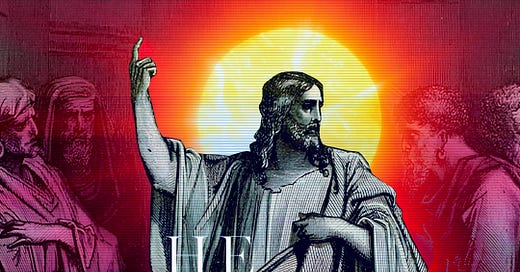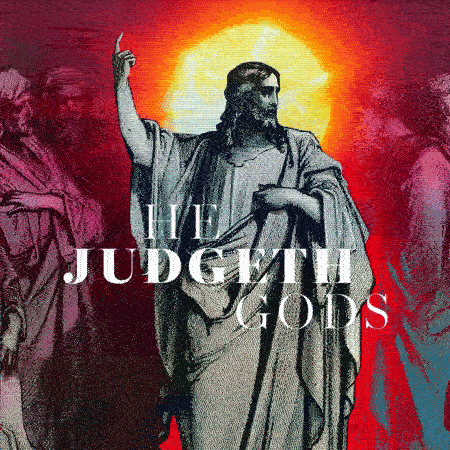A psalm for Asaph. God hath stood in the congregation of gods: and being in the midst of them he judgeth gods. (Psalm 81:1 DR)
When I pray the Rosary I have developed a habit of associating a verse of the Psalms with each mystery, both to tie the Rosary more fully into its origins but also to give my mind another hook, as it were, for meditation.
For the fifth Joyful mystery—the Inventio in Templo, the Finding of Jesus in the Temple—I have found Psalm 119:99-100 to be especially apropos:
I have understood more than all my teachers: because thy testimonies are my meditation. I have had understanding above ancients: because I have sought thy commandments. (Psalm 119:99-100 DR)
One thing that has always struck me about this scene from Jesus’ life—beyond the incredible wisdom He had as a twelve year old—was how the people who had been looking for the Messiah ended up missing Him, even when He was right in front of them. The Word Himself was speaking words to them, and while they were astonished at His wisdom as a child, that astonishment did not translate into belief. Perhaps it was a novelty or a quirk, something interesting but not ultimately life-transforming. It is not out of the realm of possibility that some of the same people who heard Him speaking as an adolescent also heard Him speak as an adult, and may themselves have voiced both their acclimation of His Kingship and—regrettably—their desire for Him to be crucified.
I wonder in my own life how often I miss Jesus when He is standing right in front of me. How often do I hear the Word speaking, but fail to actually hear? In my mediation on this mystery I can only but pray for the grace to not miss Him when He speaks.
The Psalmist begins this Psalm with a provocative statement that God hath stood in the congregation of gods. The monotheism of the Psalmist is not in question, and thus the term gods must be understood rightly, as will be seen later on in this Psalm. The meaning becomes clear—the term gods is being used for men, especially those who are or presume themselves to be judges:
The holy prophet pronounces that God is always present with judges when they are delivering their judgment, and that he sits in judgment on theirs. A consideration that would prove highly useful to judges, if they would seriously consider that all causes will be judged in the sight of the supreme Judge. “God hath stood;” is always present in his majesty, though invisible; “in the congregation of gods;” in the assembly of the judges when they meet to sit in judgment; and, while they are judging the people, he, “in the midst” of them standing by, judges the judges themselves. (St. Robert Bellarmine, A Commentary on the Book of the Psalms, 81, 1.)
This of course gives perspective to our Lord’s words—often misunderstood in the modern world—that we should Judge not, that you may not be judged, for with what judgment you judge, you shall be judged: and with what measure you mete, it shall be measured to you again. (Matthew 7:1-2 DR) It is because the Lord stands in the midst of gods that He judges them; His eyes are always upon our actions (cf. Psalm 10:5-6).
The gods in view here are generally understood by the Church Fathers as ultimately referring to Christians who have been made sons of God by adoption in grace; this partaking in the divine nature (cf. 2 Peter 1:4) is the divinization or theosis which characterizes members of Christ’s mystical Body as gods, certainly not by becoming God absolutely but rather by grace in the charity of God poured forth into the soul by the Holy Ghost (cf. Romans 5:5). This supernatural life of grace elevates the mundane nature of man beyond the merely natural to share in the supernatural life of God:
But you will find that the Word of God calls gods, both the Heavenly Beings above us, and the most beloved of God, and holy men amongst us, although the Divine Hiddenness is transcendently elevated and established above all, and no created Being can properly and wholly be said to be like unto It, except those intellectual and rational Beings who are entirely and wholly turned to Its Oneness as far as possible, and who elevate themselves incessantly to Its Divine illuminations, as far as attainable, by their imitation of God, if I may so speak, according to their power, and are deemed worthy of the same divine name. (Dionysius the Areopagite, On the Heavenly Hierarchy, 12.3)
For St. Augustine this view of the gods in this Psalm holds, although he locates this first passage in the life of Christ, for the term used for congregation in the Latin is synagoga, and thus God stands in synagoga deorum; that is, in the synagogue of gods. He goes on to note that there is thus a distinction between the synagogue and the Church:
By the synagogue we understand the people of Israel, because synagogue is the word properly used of them, although they were also called the Church. Our congregation, on the contrary, the Apostles never called synagogue, but always Ecclesia; whether for the sake of the distinction, or because there is some difference between a congregation whence the synagogue has its name, and a convocation whence the Church is called Ecclesia: for the word congregation (or flocking together) is used of cattle, and particularly of that kind properly called flocks, whereas convocation (or calling together) is more of reasonable creatures, such as men are. (St. Augustine, Expositions on the Psalms, 81, 1.)
He then develops the idea that the children of Israel were sons by means of flesh, yet even in the Old Covenant was present a foreshadowing of the grace to be found in Christ:
We find that they were often called sons, not by the grace which belongs to the New Testament, but by that of the Old, the grace by which He chose Abraham, and from his flesh raised up so great a nation… For if this also were not grace, it certainly would not presently be said of us—who have the power given us to become sons of God, not for the sake of obtaining an earthly but a heavenly kingdom—in the same Gospel, that we have received grace for grace, that is, for the promises of the Old Testament the promises of the New Testament. (St. Augustine, Expositions on the Psalms, 81, 1.)
With this in mind, the temporal action of this Psalm can then be developed, for by standing in this synagogue is intimated the Incarnation of our Lord Jesus Christ:
But I think that the Psalm intimates something that took place at a particular time, by God’s standing in the congregation of gods. For that standing by which He fills heaven and earth, neither belongs peculiarly to the synagogue, nor varies from time to time. God, therefore, stood in the congregation of gods; that is, He who said of Himself, I am not sent but to the lost sheep of the house of Israel. [Matthew 15:24] The cause too is mentioned; but in the midst, to judge of the gods. (St. Augustine, Expositions on the Psalms, 81, 2.)
The reference to the synagogue of gods is thus not in contradiction to the Church Fathers’ interpretation of gods here as in reference to those within the Church, as gods is being used in reference to synagogue as a term of judgment itself, as the text makes clear directly following in that being in the midst of them he judgeth gods. The point that St. Augustine is trying to draw out here is that the children of Israel were supposed to be these gods; God had chosen them for Himself and brought them to the land of promise. All of these good things that the Lord had done for them were meant to eventually make them children by adoption, which is why our Lord was sent to them first (cf. Matthew 15:24). But the judgement eventually comes because they have refused to become children of God:
When I say this, I am referring to them when they received the commandments of the law that they were ordained to observe, for the prophets frequently point out that this same Lord of ours would have been their Father as well, if they did not stray from his commandments. For instance, there are the following expressions: I have reared children and brought them up, but they have despised me, and I have said, You are gods, and all of you children of the Most High… Even if we were to disregard those prophetic sayings that refer to the fact that there would be a Christian people who would have God as their Father… there are still many other expressions whereby they are reproved for the fact that by committing sins they refused to be children. (St. Augustine, Sermon on the Mount, 2.4.15., ACCS.)
It is, of course, easy in hindsight to reprove others for missing something that seems to be obvious, but the reality is that we all are, as it were, in the congregation of gods apart from the grace received in Baptism to make us sons of God. Like the elders and scribes who heard the adolescent Jesus preaching, we can miss the Word for the voice, and we can just as easily pass by our Lord when He speaks and beckons us to Himself. God is the One Who judges in the midst of the gods, not us, and thus we have no room to boast or be prideful in ourselves, but can only throw ourselves upon the mercy of God and cooperate with the grace that he provides, lest we also refuse to be children.
I found this great engraving of Jesus teaching and thought it might work nicely for this verse. I cut out the figure so I could replace the halo in After Effects and then added a bunch of glows and such. I then played around with some glitch effects to keep things pretty subtle.
Enjoy.
A psalm for Asaph. God hath stood in the congregation of gods: and being in the midst of them he judgeth gods.
(Psalm 81:1 DR)
View a higher quality version of this gif here:













Share this post